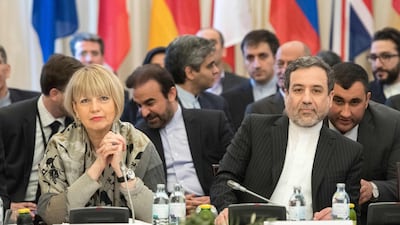Now that the president of the United States has named John Bolton as his new national security advisor and nominated Mike Pompeo to be the next Secretary of State, we enter the "be careful what you wish for" stage of US-Middle East politics.
These appointments mean that it is virtually certain that sometime in the middle of May, the United States will withdraw from the Iran nuclear deal. The president has said he was inclined to do this to many including recent visitors from the region. Washington observers like Senate Foreign Relations Committee chair Bob Corker have predicted it. Mr Bolton has frequently called for it.
Expect it to happen. The big question becomes: then what?
Three types of fall-out from this action are likely. At least two of them and possibly all three will be seen by those who have advocated for this action from the US as unhappy outcomes.
First, rather than isolating Iran and putting pressure on that country’s leaders, unilateral US withdrawal will isolate America. None of the other signatories of the JCPOA (the acronym for the nuclear deal) will go along with the US. All will continue to honour the deal. Most will assist Iran to make up for the pressure imposed by the US.
The US will be seen as a rogue state among the leaders of the international community. Its standing will falter. It will be seen as less reliable as a negotiating partner. (A nuclear deal with North Korea, always a long shot, will be torpedoed by this action as the North Koreans will have zero reason to believe any commitments made by US negotiators.) But most importantly from the point of view of those who support such a pull-out, it won't increase pressure on Iran in any meaningful way and it will weaken the US as a diplomatic or political force on many levels.
_______________
Read more from Opinion
The Skripal case provides a textbook example of how the Kremlin works
Our aim is to change perceptions, break down barriers and promote inclusion
_______________
Second, and this falls more directly into the category of unintended consequences, as the legal pressure on the president of the United States grows due to the investigation of the special counsel and potential investigations from both the press and, after the November elections, from a Democratic House of Representatives, new questions will arise about the influence of Middle Eastern leaders and donors on the decisions of the US.
In other words, the decision to unilaterally pull out of the Iran deal will not simply be seen as a bad idea from a president with little grasp of its consequences, it will be examined as evidence of heightened influence from abroad. This will, in turn, deepen investigations in this area, which are likely to persist and grow more intense as this year progresses. The result may be, therefore, that rather than strengthening US allies in the region, the relationships are inadvertently compromised.
Finally, this will leave only one avenue for the US president and his allies who have supported the pull-out from the Iran deal to prove that the pull-out was necessary. That is, of course, to raise tensions with Iran to the point that the country is seen as a greater threat and, perhaps, to the point that armed conflict is the result.
One question at this time will be whether this conflict involves the military forces of the US or proxy actors who have American support. The latter seems slightly more likely given US politics and the lack of appetite for more deep military engagement in the region. But whether the US military is directly involved or the confrontation involves Arab powers, the likelihood of conflict between the US and/or its allies with Iran is higher now than it has been at any time in modern memory.
The US is led by a wounded president surrounded by hawkish advisers who have identified and prioritised two potential international scapegoats who they have long believed should be the targets of pre-emptive strikes. One is North Korea. but because it has a developed nuclear arsenal and the ability to inflict massive conventional damage on South Korea, the costs of an attack on them are so high that it makes it the less likely victim of a first attack from this new US team.
So that leaves Iran. While a war with Iran or direct strikes against Tehran would be costly, they can’t be ruled out. And in any event, the heightened tensions that seem certain to come may well have consequences for traffic through the Strait of Hormuz and the perception of political risk associated with the region. Is this likely to constrain Iran’s behaviour?Achieve the goal of reducing long-term risks better than the JCPOA?
To both questions, the answer is probably not. But we have entered a period in which reason and rationality may not guide outcomes as they have in the past and impulsiveness and external, unrelated pressures may force action where it should not come. And for that reason, the arrival of the new US national security team should be seen as a source of apprehension by all those with interests in the peaceful future of the Middle East.

